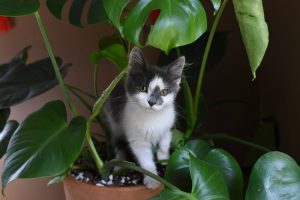 Plants not only make the air we breathe, but they also help create a calming space within a home. The act of caring for plants is relaxing in and of itself, as you work with the soil to help things grow. However, if you have pets, then you may be afraid to keep the greenery or flowers for fear that your cat will develop a taste for them.
Plants not only make the air we breathe, but they also help create a calming space within a home. The act of caring for plants is relaxing in and of itself, as you work with the soil to help things grow. However, if you have pets, then you may be afraid to keep the greenery or flowers for fear that your cat will develop a taste for them.
Or you may feel as though you have to hide them on the very top shelf. Cats in particular love to taste-test new things when they’re out exploring the far reaches of your home. So what will be safe for their sensitive anatomy? Find out which plants may harm your cat, and which ones you’re free to stock up on.
INDOOR VS. OUTDOOR
One pro tip before we start breaking down the specifics. Indoor cats are certainly much less likely to be killed by your plants, so keep this in mind. Those azaleas you’ve been growing in the garden outside? They can be deadly to your cat in the right quantities. If you’ve been keeping your cat outdoors, consider the many threats out there that may compromise their safety, From drivers with a lead foot to the seemingly harmless flower in your neighbor’s yard, it’s much harder to protect them when they’re away from home.
KEEP AWAY
Not all plants are going to harm your cat, but there are certainly some that can either make them sick in small doses or take their life in larger doses. Lilies, rhododendrons, autumn crocuses, chrysanthemums, Spanish thyme, and tulip bulbs should be kept away from your cat at all costs. Amaryllis, castor bean, English ivy, marijuana, oleander, sago palm, and cyclamens all have to go as well. Yew, narcissus bulbs, and kalanchoe are also off-limits. Please note that this is not every single plant that may harm your cat, but they are some of the more common plants found in homes everywhere.
For a more comprehensive list, see below:
- Amaryllis
- Lilies
- Autumn Crocuses
- Chrysanthemums
- Kalanchoe
- Marijuana
- English ivy
- Castor bean
- Aloe
- Daffodils
- Oleander
- Narcissus bulbs
- Tulip bulbs
- Yew
- Spanish Thyme
TASTE TEST APPROVED
We’re not saying that you should let your cat eat copious amounts of your plants. However, if they were so inclined, the following plants will not harm them should they accidentally ingest a leaf or two. So grow your American Beauties or your Dancing Ladies without fear.
- Roses
- Orchids
- Spider plants
- Bamboo palms
- African daisies/African violets
- Boston ferns
- Money plants
- Lillyturf
- Areca palms
SIGNS AND SYMPTOMS OF TOXICITY
If you’re wondering how to identify if your cat has been affected by a plant, look for signs of itchiness or an upset stomach. Swelling and redness may also occur or difficulty with breathing or swallowing. Vomiting, excessive urination, or loose stools may also point to a bad reaction. If your cat is exhibiting any of these symptoms, it’s time to take them to the vet. A trained professional is there to not only treat the visible signs, but also the underlying condition.
For more information or to schedule an appointment, contact Babcock Hills Veterinary Hospital today.

